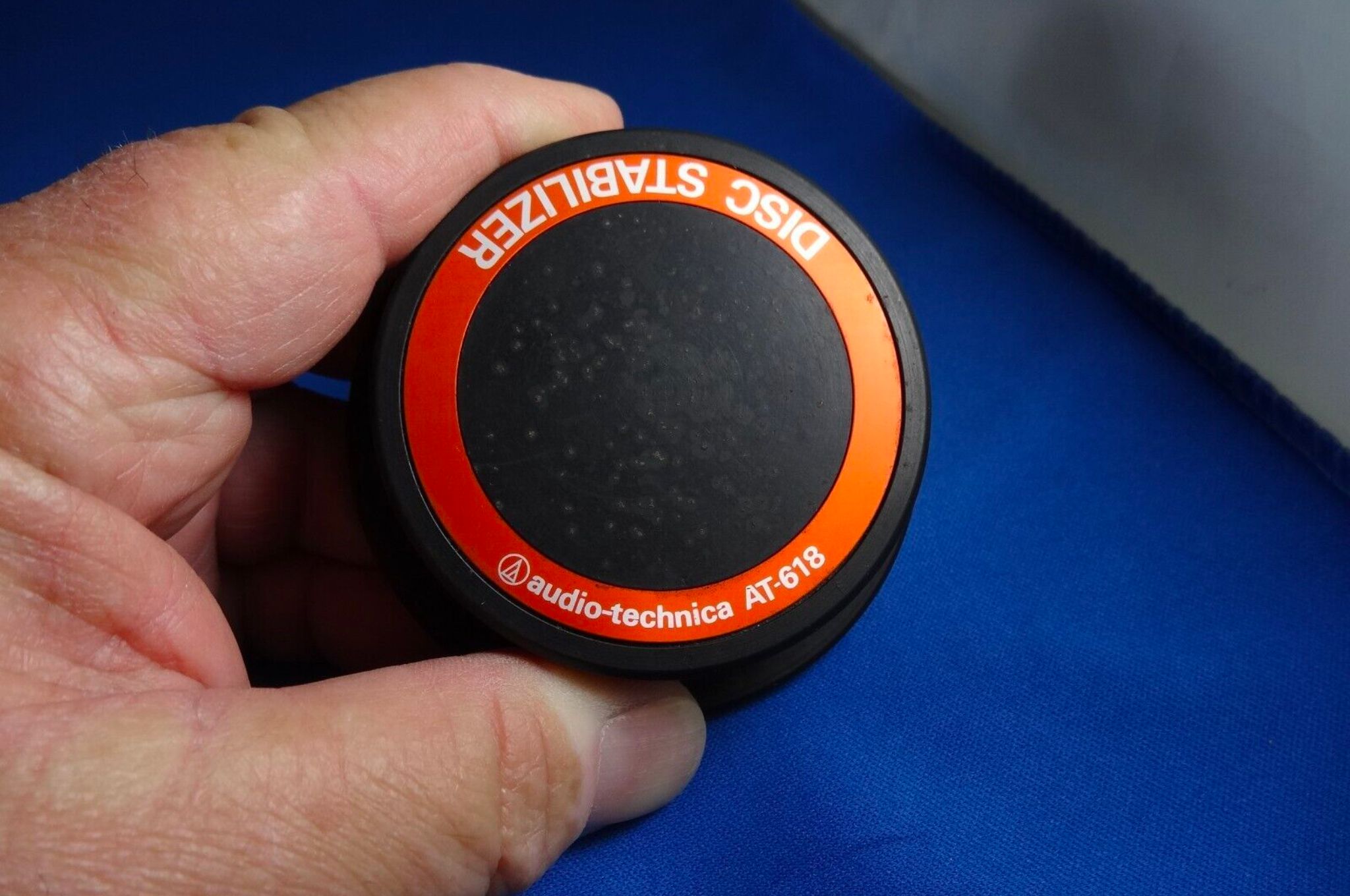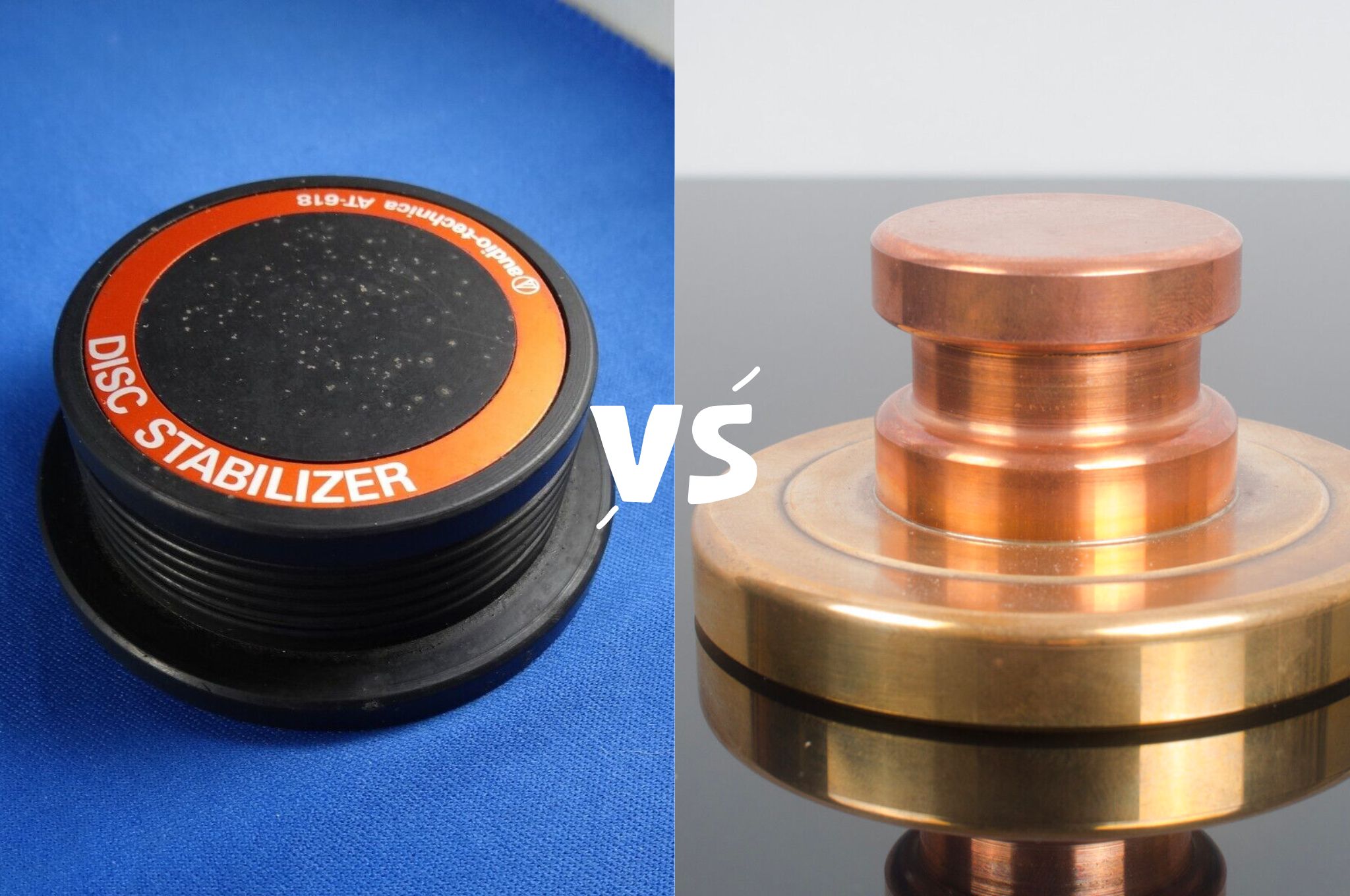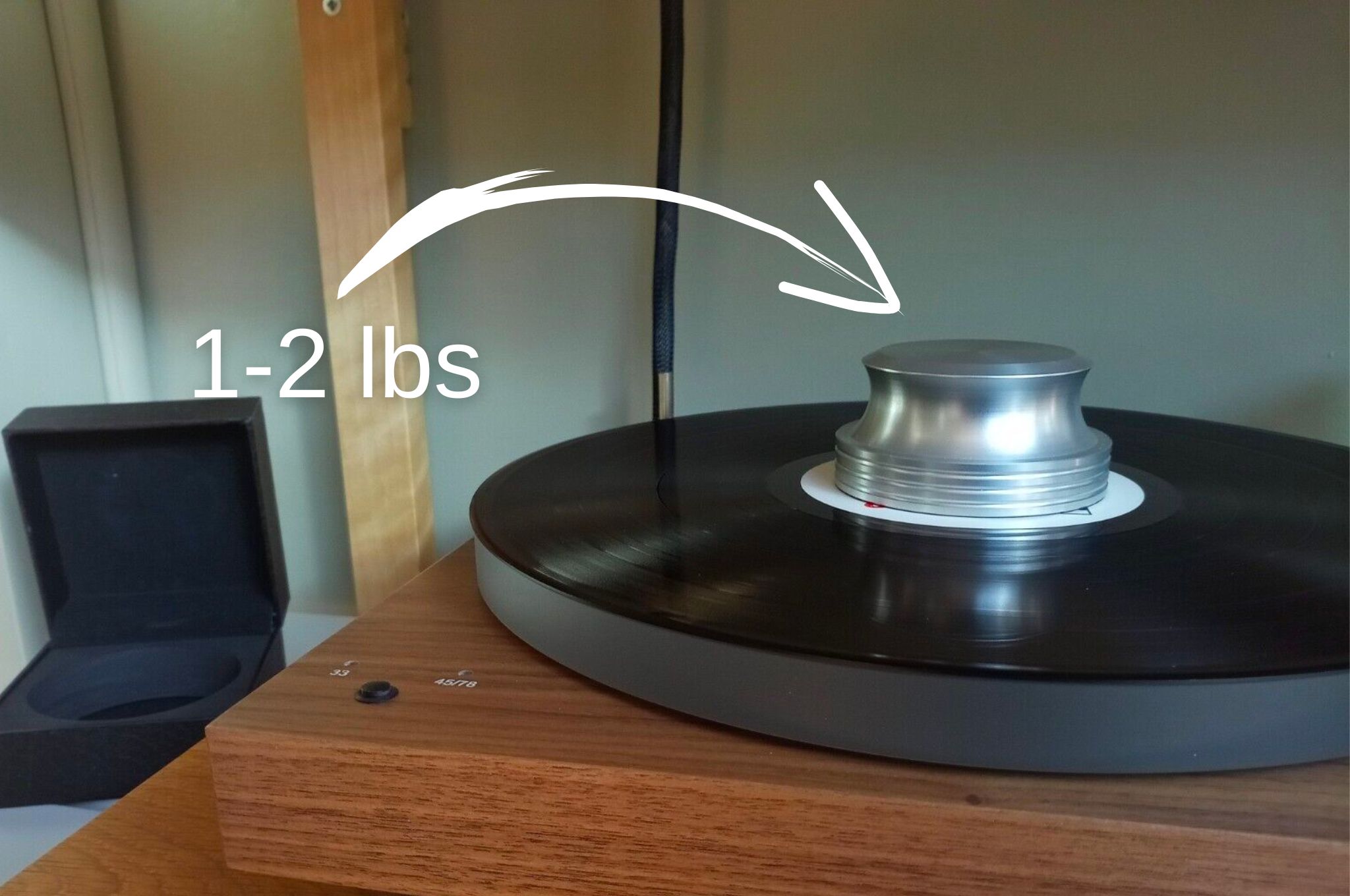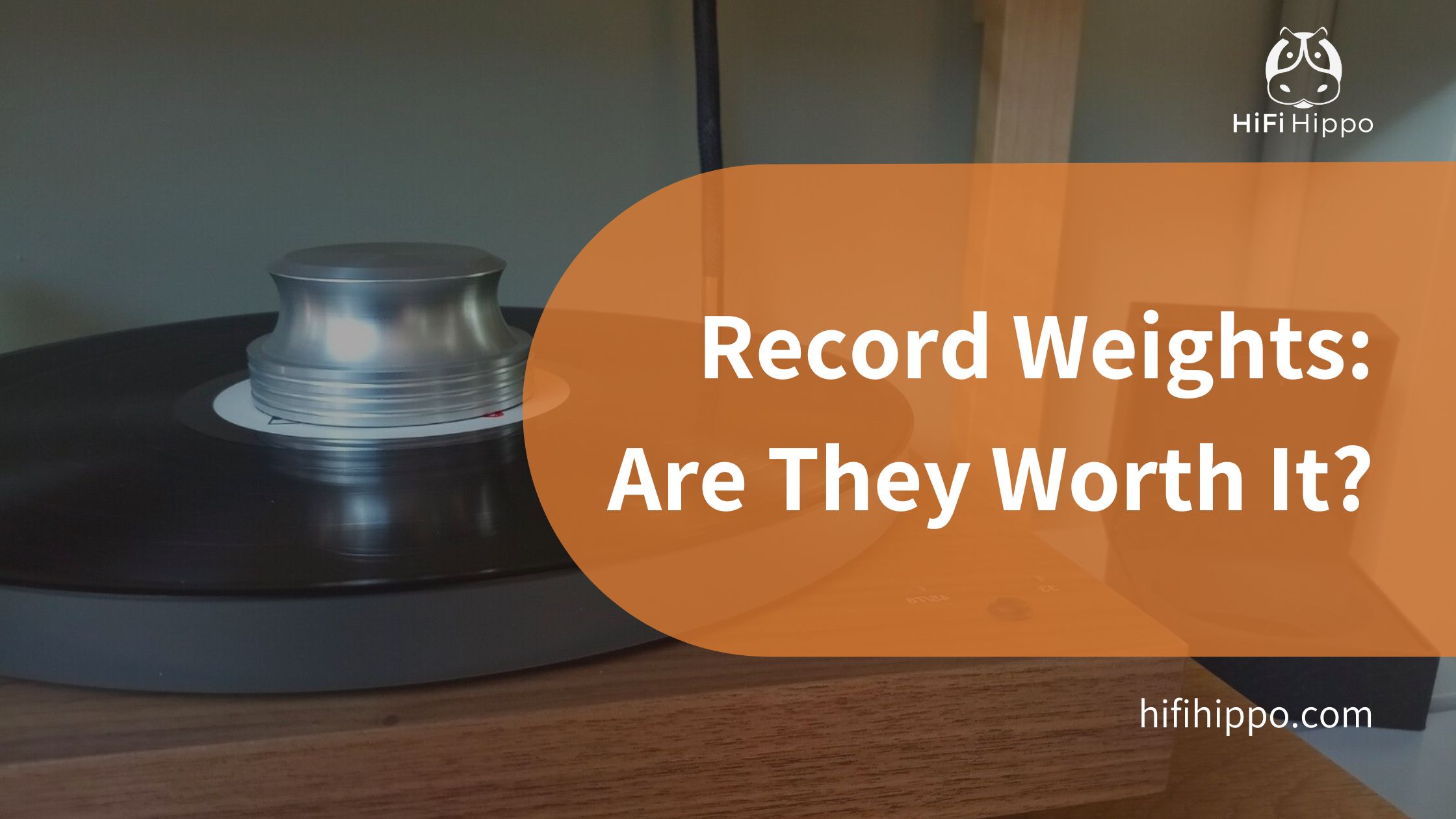Some people assume that when you throw on a record that the sound it produces is the best you can get when in reality, there are numerous factors that can affect the audio quality. Outside of the turntable components themselves, not all records are made the same, as some may be much lighter or heavier than others.
This alone can affect playback depending on various aspects, but there are tools you can use to ensure your record spins efficiently and accurately every time. With that being said, a record weight can be pretty helpful, and this article will explore what they are and if you should be using one yourself.
What Are Record Weights?

A record weight is a puck-like device that comes with a handful of benefits for the playback of your vinyl records. Record weights help in keeping records flat and stable, which allows the stylus to track the groove more precisely without adding unwanted vibrations. A stylus naturally vibrates during operation, but this vibration can sometimes make it harder to properly track within the grooves. Not only will this affect the overall sound, but it could potentially add more distortion as well.
Record weights or record clamps can be a solution to a handful of issues you’re bound to encounter at one point or another. Not all records are the same, especially if you like building a collection of old and new vinyl. It doesn’t matter how high quality your turntable may be; the physical state of a vinyl record can be a large factor in how the music sounds.
You can also easily apply or remove a vinyl record weight at your leisure, as some records may need much more additional weight than others. Many records out there are in pristine condition and offer a substantial weight – 180 grams or more; in that case, adding weight may have diminished effects.
Below, I’ll break down the various benefits that record weights have to offer.
What is The Purpose of a Record Weight?
A record weight comes with multiple benefits that can improve the overall sound quality of any vinyl record. Many turntables come with vibration-damping features, and a record weight can also add to this. I briefly mentioned it above, but a stylus, along with the record’s rotation, can generate enough vibration to affect the sound quality. When you put the record weight in place, this allows the stylus to track the grooves with more precision while reducing the consistent vibrations.
From another angle, a brand-new vinyl record may seem as flat as can be, but the reality is that a lot of them aren’t as flat as they look. This can be even more prevalent with older records. Any discrepancies in their leveling can make it more difficult for the stylus to track the grooves, which will evidently result in a lackluster listening experience.
With the help of a record weight, you can make any of your warped records flatter while remaining in a uniform position that will help the stylus and potentially improve the output quality.
Granted, some listeners may be able to pick up on various audio discrepancies more than others, but audiophiles will definitely notice when their records aren’t performing how they should. Record weights can also help with wow and flutter, which can affect the consistency of low-frequency speed variations as well as faster frequencies. There is another tool called a record clamp that offers similar features to a record weight but also comes with its own downsides.
Difference Between Record Weights and Record Clamps

Although both weights and clamps offer similar benefits, there’s a reason why many people prefer record weights over clamps. With a record clamp, these devices clamp down on the spindle itself, and although it may help with a lot of the same things as a record weight does, many people agree they deliver more wear and tear on your turntable and records over time.
They help flatten the record, which allows the stylus to track the grooves better and doesn’t require as much weight to achieve this. You’ll also want to consider that a record clamp isn’t as easy to adjust, and if you happen to over-tighten it, then you could possibly set yourself up for irreversible damage to your vinyl records and turntable platter.
When reviewing the two online, you’ll see many comments from audiophiles that mention one or the other being more optimal for certain turntables, which is true in many cases. At the end of the day, both record weights and clamps are aimed at optimizing your listening experience. Record weights are the top choice for most turntable enthusiasts, but you’ll want to consider both based on the type of equipment you’re using and the desired outcome you’re looking for.
What is The Average Weight of a Record Weight?

Most record weights don’t weigh too much, but they offer enough to be effective. You’ll find a decent range among what’s available on the market, whereas some can reside slightly under a pound, and others can be up to nearly two pounds.
Many vinyl enthusiasts can easily tell the difference, but you’ll want to choose a record weight based on what you’re trying to accomplish.
This coincides with how your turntable and stylus perform and the quality of the vinyl records you’re using. For instance, if you have a fairly warped record, it may be a good idea to go with a heavier record weight. If you’re just looking for a minor adjustment in vibration and resonance control, a lighter record weight should do just fine.
It wouldn’t hurt to have a few different record weights on hand because the quality of your vinyl collection will generally vary as well as it expands. You’ll have some records that sound perfect, while others may need some assistance to get the best quality out of them.
Is A Record Weight Worth It?
This article offers plenty of reasons why you may need a turntable weight, but I wouldn’t say they’re always necessary. Based on the quality of your turntable, styles, and vinyl record collection, you could already be enjoying a near-perfect listening experience. Then again, having a record weight on hand to add additional weight to warped records or those that are lightweight can help improve the fidelity of the sound as well.
Some of it considers your personal preference, but you should have a decent understanding of what’s causing the issues in your listening experience, and that will help you determine if a record weight is worth the buy. Nevertheless, they aren’t extremely expensive, and it’s a handy tool to have if you’re experiencing some trouble with vibrations, resonance, or tracking.
How Much Are Record Weights?
Depending on the brand, size, and material quality, you can expect many record weights to range from $12 to $50 on the higher end. They can get even more expensive with more premium styles, but I wouldn’t say expensive equates to the best quality. As stated earlier, different weights work well with specific scenarios, so having more than one record weight may be advantageous to achieve optimal performance from each of your records.
From another perspective, you don’t want to rely on low-quality record weights as they may not deliver what you’re hoping to get out of them. At the same time, poorly made record weights could potentially damage your turntable or the record itself, so it’s vital to do your research before you decide to make a purchase. Overall, this article has everything you need to know to find a record weight that’s right for your particular situation and needs.

Senior Reviews Editor
Lucas is the Senior Reviews Editor at HiFi Hippo covering a range of topics relating to turntables, preamps, speakers, and everything vinyl. With 15+ years of music experience, Lucas uses his unbiased ear to guide readers in the right direction for all their viny land home audio needs.
